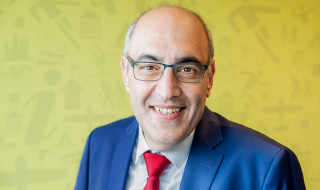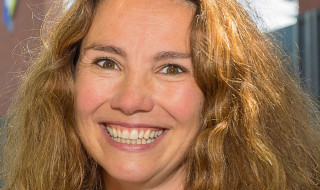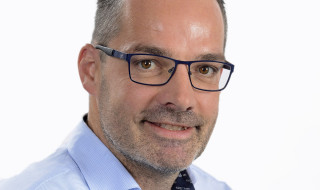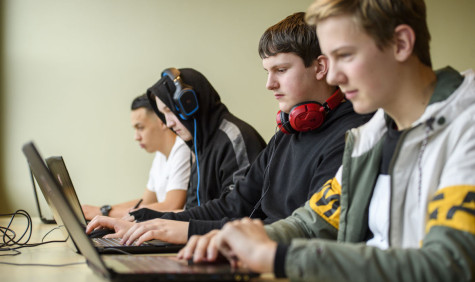The mbo brings volume and connection
As many as 49 of the 59 mbo institutions are members of SURF and interest from other schools is high. Since 2014, the mbo is represented in the member council with 3 members and since this year it also contributes to the innovation funds. This makes the sector a full member of the SURF cooperative. An interview with Adnan Tekin, Mirjam Koster and Martijn Timmer about cooperation in diversity.
In the summer of 2020, Adnan Tekin became president of the MBO Council. In the eighteen months that followed, he has seen a change in the thinking on digitization in the mbo. 'It has dawned on everyone that digitisation is not just something that happens in business operations, but goes to the heart of education,' he says.
That's how fast things can move. Of course COVID-19 plays a role, but it is also due to the social mission that the mbo fulfills. Part of the future of the mbo lies in lifelong development,' says Tekin. Without digitalisation this will succeed. Or consider citizenship in the digital world. We put students in their power. That is why we have invested a lot in the past few years in the innovation program Doorpakken op digitalisering. That is now bearing fruit.

Adnan Tekin, chair MBO Council
Cybersecurity is another such topic that no educational institution can ignore anymore. 'We have a joint responsibility. Not only to protect our innovations, but especially our students and employees. We can't do that alone. We need SURF involved, and the ministry.'
"If we participate in a SOC, we immediately protect an additional 500,000 students and 50,000 staff. That will make the whole education system safer."
More volume and diversity
All in all, Tekin believes it is no surprise that the interest shown by institutions for vocational education and training in SURF is high. Of the 59 schools, 49 have already joined the cooperative and there is also interest from the others. According to Mirjam Koster, this development is interesting because of the volume. Koster is chair of the Board of Governors of Graafschap College, chair of mbo Digitaal, and a member of SURF's Members' Council. We bring more weight to the table. If we participate in a SOC (security operations center), we immediately protect an additional 500,000 students and 50,000 staff. That will make the whole education system safer.'

Mirjam Koster, chair of MBO Digitaal
Besides the large number of institutions, the mbo are also diverse: from large to small and from broad to specialised. This presents a challenge, Tekin acknowledges. You have a different conversation with the ROC van Amsterdam than with the Leidse Instrumentmakers School. "We need to organise this properly ourselves as a sector, but SURF will also take this into account when providing services."
From saMBO-ICT to MBO Digital
The mbo has a long tradition of collaboration in the field of digitalisation. MBO Digitaal originated from the saMBO-ICT foundation. This network started in 2010 as the follow-up of an older partnership, ROC-i-partners. Over the years, it developed into the knowledge platform for IT in the mbo. Conferences and meetings are well-attended, and not only by hardcore IT professionals. Last year, saMBO-ICT merged with the MBO Digitaal platform. This is part of the MBO Council, in which all the mbo institutions in the Netherlands are united. 'When I started as chair, I found it extraordinary that saMBO-ICT had been placed outside the organisation,' says Tekin. 'If you know that digitisation is an essential part of education, then you have to merge that into the organisation. I am glad that this has now happened.'

Martijn Timmer, MBO Digital
That joy is shared by Martijn Timmer. As manager of MBO Digitaal, he works closely with SURF. MBO Digitaal explains what the institutions need in order to make progress. This is how we give shape to SURF's services. We collaborate with SURF where possible, for example in the area of cybersecurity. And we are acting jointly with the higher education sector architecture HOSA when it comes to our sector architecture, the MOSA.' Kennisnet also plays a role in digitalisation in the mbo.
Influence on the innovation agenda
Since January 2022, the mbo has been contributing financially to SURF's innovation resources. What will the other members notice? 'Our added value lies in applications in professional practice and our contacts with the business community,' says Tekin. 'We are most experienced in demand articulation from companies and organizations.'
When it comes to knowledge sharing, the mbo takes a different approach from the other members; knowledge sharing for the mbo is organized within mbo Digitaal. 'We work with proven partnerships that go back decades,' says Koster. 'I don't know whether it is of added value to bring this into practice within SURF at this point in time.' In any case, we are increasingly moving towards cross-sector knowledge sharing via topics such as standards or agreements about what is on offer in the context of lifelong development.' The mbo has brought a great deal of knowledge to the table about working with the open source program Xerte and open educational resources. In the area of new technology, we work closely with the professional practice, because everyone is still searching,' says Koster. The line between skills for intermediate and higher vocational education is becoming more diffuse. All sectors contribute proportionally to bringing an industry like automotive in transition.'
"The National Growth Fund application gives a huge pendulum to innovation and that is necessary for the future of the Netherlands."
Education Digitisation Impulse
The fact that the sectors are increasingly converging is also demonstrated by the fact that all 113 mbo, hbo and wo institutions have committed themselves to the Education Digitalisation Impulse proposal. If this application is approved by the National Growth Fund (a decision is expected in April 2022), a new education innovation programme will start for all sectors in 2023. This will be the follow-up to the mbo innovation programme Doorpakken op digitalisering and the ho-innovation programme Versnellingsplan Onderwijsinnovatie met ict. Both programmes end in December 2022. A few years ago, no one would have thought it possible that the mbo, hbo and wo would tackle this together,' says Tekin. The National Growth Fund application gives an enormous boost to innovation and that is necessary for the future of the Netherlands. We are therefore assuming that this application will be honoured.
Timmer is also optimistic. Whether we receive money or not, the joint ambitions are there. We can no longer ignore that.
'The joint ambitions are there. We can no longer ignore that.'
Teacher professionalisation
Of course it will continue,' says Koster decidedly. She is charmed by the part of the NGF application that helps to promote the digital skills of teachers: the Centres for Teaching & Learning. The proposal states that all 113 institutions will set up their own Centres for Teaching & Learning. In doing so, they will build on what is already present locally in the area of teacher professionalisation. I'm looking forward to us spinning a kind of web over all the Dutch institutions for mbo, hbo and wo, guided by good research and with a smart project organisation. What we learn locally will be elevated and connected. It is important that we know what is happening further down the line.
Text: Marjolein van Trigt
New members: HMC and SVO Vakopleiding Food
SURF's newest members include the Hout- en Meubileringscollege (HMC) and SVO Vakopleiding Food. Both mbo institutions indicate that they would like to collaborate with other institutions and sectors within SURF for security, infrastructure services, and educational innovation. Their students increasingly come into contact with digital teaching methods during their studies. The institutions see digital skills and knowledge of digitization as indispensable in the job market for all students.
MBO brings volume and connection is an article from SURF Magazine.
Questions following this article? Mail to magazine@surf.nl
